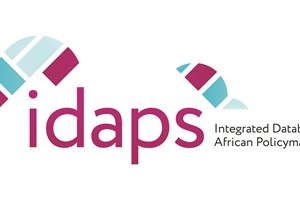IDAPS
Countries / Regions
Global application
Partners
Walker Institute, Evidence for Development
Project Team
Prof. Ros Cornforth, Dr. Celia Petty, Mr. Dai Clegg, Dr. John Seaman
Background
In order to understand how climate change will affect different groups within a population, information is needed on their current livelihood systems as the impact of climate change will vary according to the range of crops they grow, how much they sell, how much they keep for their own consumption and what access they have to other sources of income. This information is routinely collected in many countries across sub-Saharan Africa as part of food security assessments, using the Household Economy Approach (HEA).
The HEA methodology is now being applied by Evidence for Development and the Walker Institute to model the impact of climate change on rural livelihoods: to understand who will be affected and in what ways, by a defined climate change scenario, in a specified ‘livelihood zone’. To achieve this, we have developed IDAPs: the Integrated Database and Applications for Policymakers. IDAPs is a cloud-based database, making it globally accessible for use by anybody with an internet connection. It brings together data from climate, agronomy and hydrology to model the impact of climate scenarios on people’s livelihoods and their ability to access their basic food and non-food needs. In developing IDAPs we have populated the platform with data from a wide range of sources including the HyCRISTAL project which the Walker Institute is working on with multiple partners including Evidence for Development, BGS, NERC and many others. IDAPs brings together data sets from across disciplines and presents this data in ways that are meaningful and understandable to non-specialist stakeholders, enabling them to interact with this data for the first time.
Climate change, is usually expressed in high-level soundbites that do not relate to everyday experience. Or in complex models that include too much variability to be useful to decision makers. We hope that IDAPs is a way to integrate all this data, to express its implications in scenarios that map onto the livelihoods of real people; and so to address the needs of policy makers and other stakeholders.
The project will assist policymakers globally, including disaster management agencies, agricultural management services and others, in understanding and responding to the effects of climate change. A key aim of IDAPs is to ensure that resource-poor government agencies are better able to target their limited resources to those in most need in a timely way.

Our Research
IDAPs is being created for stakeholders in Africa, along with researchers and practitioners around the world. In addition to the creation of a database, the IDAPs project aims to equip its users in Africa with relevant information as they seek to improve the lives of those suffering the effects of climate change.
Check out our Technical Brief on IDAPs!
Our Research
IDAPs is being created for stakeholders in Africa, along with researchers and practitioners around the world. In addition to the creation of a database, the IDAPs project aims to equip its users in Africa with relevant information as they seek to improve the lives of those suffering the effects of climate change.
Check out our Technical Brief on IDAPs!
Our Impact
Initial IDAPs user forum was hosted in 2017 by the Uganda National Council for Science and Technology (UNCST). Key attendees included four Members of Parliament, including Hon Cecilia Atim Ogwal (Deputy Speaker) and the leader of the Parliamentary Forum on Climate Change; the Assistant Commissioner, Ugandan Ministry for Water and Environment (MWE); Deputy Executive Secretary of UNCST; a senior representative from Uganda’s National Emergency Coordination and Operations Centre; representatives of civil society climate change advocacy groups; and, senior district level technical officers.
This wide-reaching group of stakeholder engagement was the first step towards ensuring that the IDAPs platform is accessible and applicable to the wide range of users required for successful and informed decision making. Two further stakeholder consultation meetings have taken place since then and more are planned to make sure IDAPs is meeting the needs of its users.
Eventually, IDAPs should indicate how different climate scenarios might affect livelihoods in different communities, enabling policy makers and other stakeholders to direct resources more effectively. However, IDAPs is not yet fully implemented, but one good measure of the value of its vision and goals is the engagement, interest and support we are receiving from our stakeholders.
IDAPs success measures are:
- The adoption of IDAPs tools by policymakers, evaluated by feedback from researchers, and through testing it in selected pilots.
- The use of the IDAPs database/platform by other researchers.
- Evidence of people proactively using the IDAPs platform to inform decision making directly on the ground
Take a look at Evidence for Development’s project page for IDAPs

